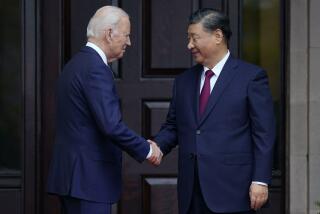Many Factors Hinder Prospects for China’s Joining WTO in ’99
WASHINGTON — Contrary to the upbeat White House commentary, the failure of U.S. and Chinese negotiators to bring China into the global trading system this week threatens to doom China’s prospects for entering the World Trade Organization this year.
Chinese negotiators don’t want to jeopardize their fragile financial system or the economic health of such key sectors as textiles. Their U.S. counterparts are mindful that a deal could face an array of political opponents.
In this climate, officials face a steep uphill climb if they are to wrap up the remaining batch of issues in the coming months. The sticking points include Chinese barriers to U.S. movies and to auto loans by U.S. banks in China, and U.S. restrictions on Chinese textiles.
“I’m not optimistic,” said Nicholas R. Lardy, a China expert at the Brookings Institution, a Washington think tank. “It seems to me you lose momentum, and without the momentum each side loses flexibility.”
President Clinton and Chinese Prime Minister Zhu Rongji on Thursday hailed the “significant progress” achieved by the two sides toward reaching an agreement on China’s joining the WTO. China made concessions on agriculture, industrial products and information technology. The White House also trumpeted a new deal on aviation and a Chinese pledge that its government agencies would stop using pirated computer software.
Based on these and other compromises, administration officials claimed Thursday that the recent flurry of talks had achieved gains that would enable China to enter the world’s formal trading system later this year, when it hopes to participate in a new round of trade talks in Seattle. Speaking to reporters, U.S. Trade Representative Charlene Barshefsky described the dense set of agreements related to market access, tariffs, quotas and time schedules as “a remarkably strong commercial package by any conceivable measure.”
Nonetheless, the failure to win a complete trade agreement represented a disappointment both for China and for advocates of a deal inside the White House.
To join the WTO, China needs approval from various influential trading nations, but America’s leading role in the world economy gives it the most influential voice.
Administration officials have maintained that they will endorse only a clear-cut deal that benefits the U.S. Some officials have argued that lower trade barriers would reduce the U.S. trade deficit with China, which last year burgeoned to $57 billion.
Yet political realities in both countries have cast an growing shadow over the negotiations.
In Congress, a U.S.-China deal on the WTO would face hostility from groups as varied as defense hawks unhappy with allegations of Chinese nuclear espionage and liberals upset about the possibility of U.S. job losses. Conscious of the domestic sensitivities, the White House recently accepted the demand of U.S. textile interests that it maintain quotas on Chinese textile imports after such quotas expire for the rest of the world.
“China will never agree to that,” Lardy declared.
For its part, China faces multiple pressures to move slowly in opening its markets to foreigners. These include the desire to shield emerging industries and widespread economic frailty in Asia.
“One lesson learned from the Asia crisis [is that] China could see that all the countries that had opened up to foreign markets rapidly without supervision suffered a much more severe impact than China,” Shi Yonghai, an economist and president of the Chinese Academy of International Trade and Economic Cooperation, said recently. “But it does not mean China will not open up its capital market. It will just do it in stages according to a plan.”
Under the U.S.-Chinese agriculture agreement announced Thursday, China will lift its bans on shipments of citrus from California, Texas and Florida, and on wheat from the Pacific Northwest. China also agreed to eliminate inspection requirements that severely restrict the amount of U.S. beef sold there.
Under the aviation deal, flights between the U.S. and China could double. Some analysts have also emphasized that China’s lack of modern commercial laws could create enforcement headaches. For that reason alone, they say, provisions of any new trade accord must be worked out with painstaking clarity.
Nonetheless, many also believe that, whatever the near-term difficulties, China’s full involvement in the trading system will strengthen political reformers inside China, as well as offer economic benefits to the U.S. and other nations.
“Over the long term--to use the cliche--it’s a win-win for both sides,” said Claude E. Barfield, a trade specialist at American Enterprise Institute.
Times staff writers James Flanigan and Evelyn Iritani contributed to this report.
* MAIN STORY: A1
More to Read
Inside the business of entertainment
The Wide Shot brings you news, analysis and insights on everything from streaming wars to production — and what it all means for the future.
You may occasionally receive promotional content from the Los Angeles Times.









